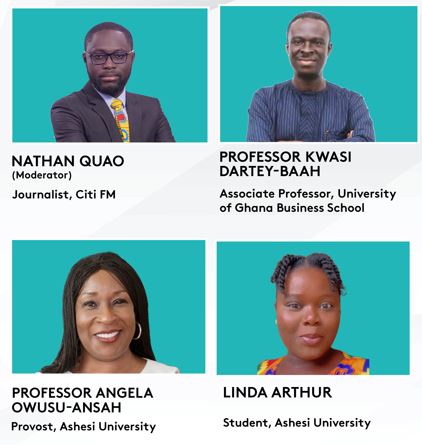The August 2022 edition of the monthly Ed-Tech Monday program, focused on the opportunities and challenges of digitizing higher learning in Ghana.
Teaching and learning during COVID-19, had a huge impact on higher education with many lecturers making a shift towards online learning. Despite the recent easing–up of COVID restrictions, online learning is still used by lecturers and students alike.
In view of this, a panel moderated by Nathan Quao discussed the challenges of digitizing higher learning, especially with many schools and higher institutions of learning, still adapting to the new trends.
The panel included Prof. Kwesi Dartey-Baah, the Associate Professor of the University of Ghana Business School; Prof. Angela Owusu-Ansah, the Provost of Ashesi University; and Linda Arthur, a computer science student at Ashesi University and project manager at ‘She Knows Initiative’.
Prof. Dartey-Baah observed that although COVID posed many challenges, it presented many opportunities as well. Lecturers were obligated to have more time-based engagements with their students through video conferencing calls and other digitized avenues.

“What COVID has done is to give us the opportunity to explore. A lot of investment has gone into the IT space. We’re not there yet, but we’ve made huge progress in that regard,” he said.
Prof. Angela Owusu-Ansah underscored the point that online learning provides alternatives to traditional learning and allows for multiple means of expression and engagement.
She explained that some students who struggle with the traditional approach are likely to flourish when presented with other digitized forms of learning.
She noted that Ashesi prioritized the health, psychological safety, and continuous learning of students in the wake of the pandemic.
Speaking from a student’s perspective, Linda Arthur said online learning has been progressive. She admitted that moving away from face-to-face learning was difficult in the beginning, however, she was quick to point out that the benefit of recorded lessons has yielded good results. Highlighting some of the challenges of digitizing higher learning, Prof. Owusu-Ansah said there are very few instructional designers to help ensure that the gap between online and face-to-face learning is bridged.
She explained that the abruptness of the shift made it near impossible for schools to carefully design online experiences for students.
She also noted that it takes a lot of self-discipline for students to join online classes from their various locations, especially when there is no supervision.
Meanwhile, Prof. Dartey-Baah highlighted the need for emotionally intelligent instructors in schools and in higher institutions of learning, since some students are introverts and others are extroverts.
He said students are more likely to open up during face-to-face encounters than during online learning, while the lack of laptops, data, and other equipment may hinder students from less-privileged backgrounds. EdTech Monday is an initiative of the Mastercard Foundation’s Regional Centre for Innovative Teaching and Learning in ICT and part of the Foundation’s strategy to find solutions to Africa’s youth employment by closing the gap in access to quality education, and advancing the integration of technology in education policies and practices across Africa.
To realize this vision in Ghana, the Mastercard Foundation has partnered with MEST Africa, a pan-African technology institution to bring the EdTech Monday show on the last Monday of every month.





